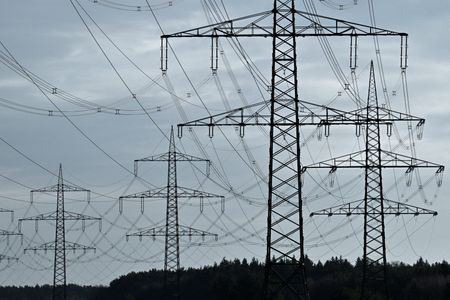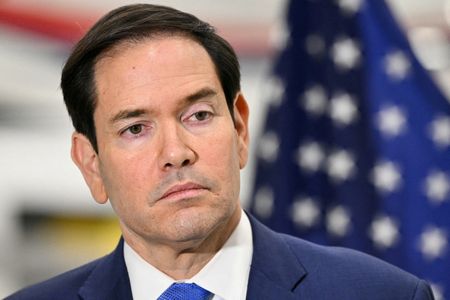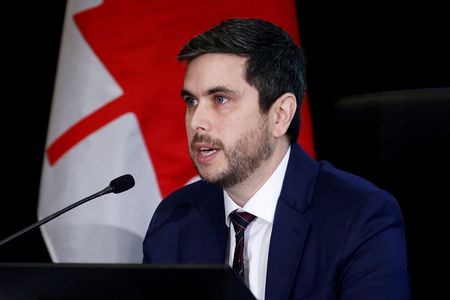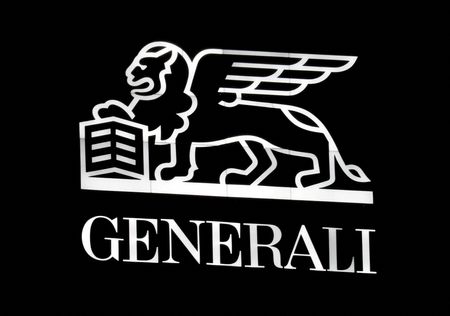By Elisa Martinuzzi, Balazs Koranyi, Stefania Spezzati, Mathieu Rosemain and Giuseppe Fonte
(Reuters) -European financial stability officials are debating whether to create an alternative to Federal Reserve funding backstops by pooling dollars held by non-U.S. central banks in a bid to reduce their reliance on the U.S. under the Trump administration, five officials familiar with the matter said.
The talks, reported here for the first time, are a reaction to policies under U.S. President Donald Trump that have upended long-standing ties, put the Fed’s independence in doubt and underlined the dominant role the U.S. plays in global finance.
The Fed’s facilities lend dollars to other central banks and function as a lifeline during bouts of market stress, ensuring global financial stability is maintained.
Interviews with more than a dozen European central banking and supervisory officials show that they worry the facilities could be weaponized by the Trump administration.
Two of the people said concerns peaked around April, when Trump’s “Liberation Day” tariffs on imports sent shockwaves through the global financial system and exposed weakness in banks’ funding plans.
Worries have since ebbed, in part due to Fed assurances, the people said. Chair Jerome Powell told a European Central Bank-hosted conference in July that the U.S. central bank has no plans to change how it offers dollar liquidity to other official entities.
Kush Desai, a White House spokesman, said Trump had “repeatedly affirmed his commitment to maintaining the strength and power” of the dollar.
ECB and Fed spokespeople declined to comment.
DOLLAR POOLING HAS LIMITATIONS
Some of the sources said that pooling dollar reserves would face practical difficulties and may not be viable.
Nevertheless, talks are ongoing at staff rather than top ECB policymaker level and involve central banks in the euro zone and outside the bloc, said four of the officials, who have direct knowledge of the matter.
One said some national central banks in the region are pushing for it.
Reuters could not establish whether central banks outside Europe were also involved in talks.
Other countries have already tried pooling resources.
The Association of Southeast Asian Nations (ASEAN) along with China, Hong Kong, Japan and Korea combined resources to assist member countries under the Chiang Mai Initiative.
Asked in July about concerns stemming from possible fragmentation in finance, Bank of Japan Governor Kazuo Ueda pointed to the initiative, which began operating in 2014 and has since grown to $240 billion.
“It would be important to keep trying a multi-layered approach to things like swap lines. Doing something similar, or continuing to do something similar, would be important,” he said.
The Bank of Japan was not immediately available to comment.
In Europe, however, several officials said their initial analysis on the viability of pooling has not been encouraging.
While non-U.S. central banks have hundreds of billions of dollars in cash combined, this does not compare with the Fed’s near-bottomless pockets as issuer of the world’s reserve currency.
Pooling could help deal with bouts of instability but is unlikely to be enough to contain broad market turbulence, they said, while any attempt to pool reserves would also face logistical and political challenges.
One top central banker said any hint from the Fed on discontinuing the swaps could itself lead to broad stress in the global financial system.
In such a situation it would be hard for a central bank to defend offering its dollar reserves to another party, the official said.
European officials are also considering other measures to improve resiliency, including increasing scrutiny of lenders.
This includes asking banks for plans to source dollars in other markets such as Asia and the Middle East, and stress testing the lenders, two euro zone banking executives said.
One of the officials involved in the discussions said the question of how to build resiliency without relying on the U.S. is raised at each meeting between central banks.
The officials requested anonymity due to the sensitivity of the discussions.
NOT ‘FIRST ORDER’ WORRY, BUT WORST-CASE SCENARIO
Dollar demand tends to spike during times of market stress, and shortages can worsen the problem.
The Fed’s facilities not only help alleviate that, they also serve wider U.S. interests.
By providing dollars, the Fed ensures that bouts of instability abroad do not turn into full-blown financial crises that could then also engulf the United States.
Usage of the facilities peaked at $449 billion during the COVID-19 pandemic in 2020.
At a meeting of the ECB’s policymaking Governing Council a few months ago, Klaas Knot, the then-head of the Dutch central bank, raised the question of reliance on the swap lines as part of “a laundry list” of potential risks, an official with direct knowledge of the matter said.
Knot was also head of the Financial Stability Board, an international body, at the time. The matter has not come up since at the Council, the official said.
An FSB spokesperson declined to comment.
An ECB supervisor said while it is monitoring dollar liquidity, the loss of swaps is not a “first-order worry”.
Nevertheless, the debate on finding an alternative has continued among European officials tasked with ensuring financial stability, including at the ECB and several central banks, five sources with direct knowledge of the talks said.
One said they are concerned about what happens when Powell’s term ends in May. Trump has said he could select the next chair by the end of this year.
One of the sources said European officials “need to consider the worst-case scenario”.
(Additional reporting by John O’Donnell, Francesco Canepa, Jesus Aguado and Simon Johnson; Editing by Paritosh Bansal and Alexander Smith)










